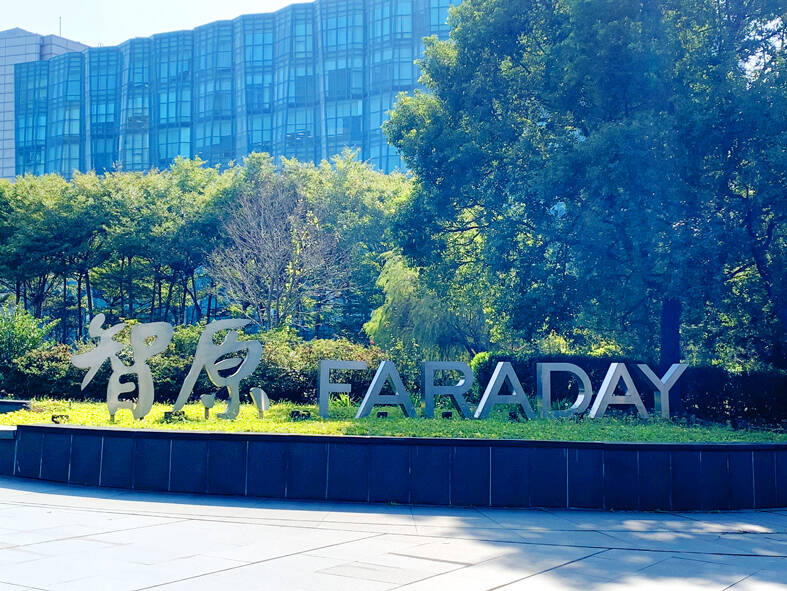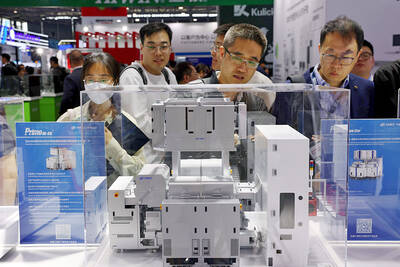Application specific integrated circuit (ASIC) designer Faraday Technology Corp (智原) yesterday raised its projected revenue contribution from artificial intelligence (AI) related business to a high single digit this year, driven by robust demand for advanced 2.5D packaging technology, and expects growth to further pick up next year with more AI chips entering mass production.
“AI products are the major driving force this year in terms of NRE [non-recurring engineering] and MP [mass production],” Faraday president Steve Wang (王國雍) told investors during a virtual conference.
Faraday, which mainly offers advanced packaging design services for AI chips, secured its first AI project at the end of last year, the company said.

Photo: Grace Hung, Taipei Times
The firm designs the interposer — a key structure providing electrical connection between chips and components inside the 2.5D packaging.
Foundry service provider United Microelectronics Corp (聯電) produces this interposer before handing it over to chip packagers.
Faraday is leveraging its partnership with Arm Holdings Ltd to expand into AI. The firm last year became the only ASIC company picked by Arm to become a partner for its Neoverse subsystems.
Faraday expects revenue this year to return to the growth track, after sliding 8.42 percent last year as customers grappled with a prolonged inventory correction cycle, Wang said.
A spike in NRE revenue would help cover the weakness in MP revenue, which would drop by about 20 percent this year, Wang said.
NRE revenue would at least double this year, after climbing 1.6 percent annually to a record-high of NT$627 million (US$19.24 million) in the first three months of the year, he said.
ASIC companies usually generate revenue from collecting NRE, the one-time cost to research, design, develop and test a new product or product enhancement, intellectual property (IP) license, or royalty and revenue after the chips they designed enters mass production.
Faraday’s growth would also be fueled by expanding its business to advanced chips made on 5-nanometer, 4-nanometer or 2-nanometer technology through its collaborations with foundry partners Samsung Electronics Co and Intel Corp.
The company expects consolidated revenue to grow by a low-single-digit percentage this quarter compared with NT$2.58 billion last quarter, led by NRE revenue, which would grow by a double-digit percentage, while IP revenue would increase by a single-digit percentage.
MP revenue would shrink by a low-single-digit quarterly due to inventory digestion, it said.

With this year’s Semicon Taiwan trade show set to kick off on Wednesday, market attention has turned to the mass production of advanced packaging technologies and capacity expansion in Taiwan and the US. With traditional scaling reaching physical limits, heterogeneous integration and packaging technologies have emerged as key solutions. Surging demand for artificial intelligence (AI), high-performance computing (HPC) and high-bandwidth memory (HBM) chips has put technologies such as chip-on-wafer-on-substrate (CoWoS), integrated fan-out (InFO), system on integrated chips (SoIC), 3D IC and fan-out panel-level packaging (FOPLP) at the center of semiconductor innovation, making them a major focus at this year’s trade show, according

DEBUT: The trade show is to feature 17 national pavilions, a new high for the event, including from Canada, Costa Rica, Lithuania, Sweden and Vietnam for the first time The Semicon Taiwan trade show, which opens on Wednesday, is expected to see a new high in the number of exhibitors and visitors from around the world, said its organizer, SEMI, which has described the annual event as the “Olympics of the semiconductor industry.” SEMI, which represents companies in the electronics manufacturing and design supply chain, and touts the annual exhibition as the most influential semiconductor trade show in the world, said more than 1,200 enterprises from 56 countries are to showcase their innovations across more than 4,100 booths, and that the event could attract 100,000 visitors. This year’s event features 17

Germany is to establish its first-ever national pavilion at Semicon Taiwan, which starts tomorrow in Taipei, as the country looks to raise its profile and deepen semiconductor ties with Taiwan as global chip demand accelerates. Martin Mayer, a semiconductor investment expert at Germany Trade & Invest (GTAI), Germany’s international economic promotion agency, said before leaving for Taiwan that the nation is a crucial partner in developing Germany’s semiconductor ecosystem. Germany’s debut at the international semiconductor exhibition in Taipei aims to “show presence” and signal its commitment to semiconductors, while building trust with Taiwanese companies, government and industry associations, he said. “The best outcome

Semiconductor equipment billings in Taiwan are expected to double this year, as manufacturers in the industry are keen to expand production to meet strong global demand for artificial intelligence applications, according to SEMI, which represents companies in the electronics manufacturing and design supply chain. Speaking at a news conference before the opening of Semicon Taiwan trade show tomorrow, SEMI director of industry research and statistics Clark Tseng (曾瑞榆) said semiconductor equipment billings in Taiwan are expected to grow by an annual 100 percent this year, beating an earlier estimate of 70 percent growth. He said that Taiwan received a boost from a